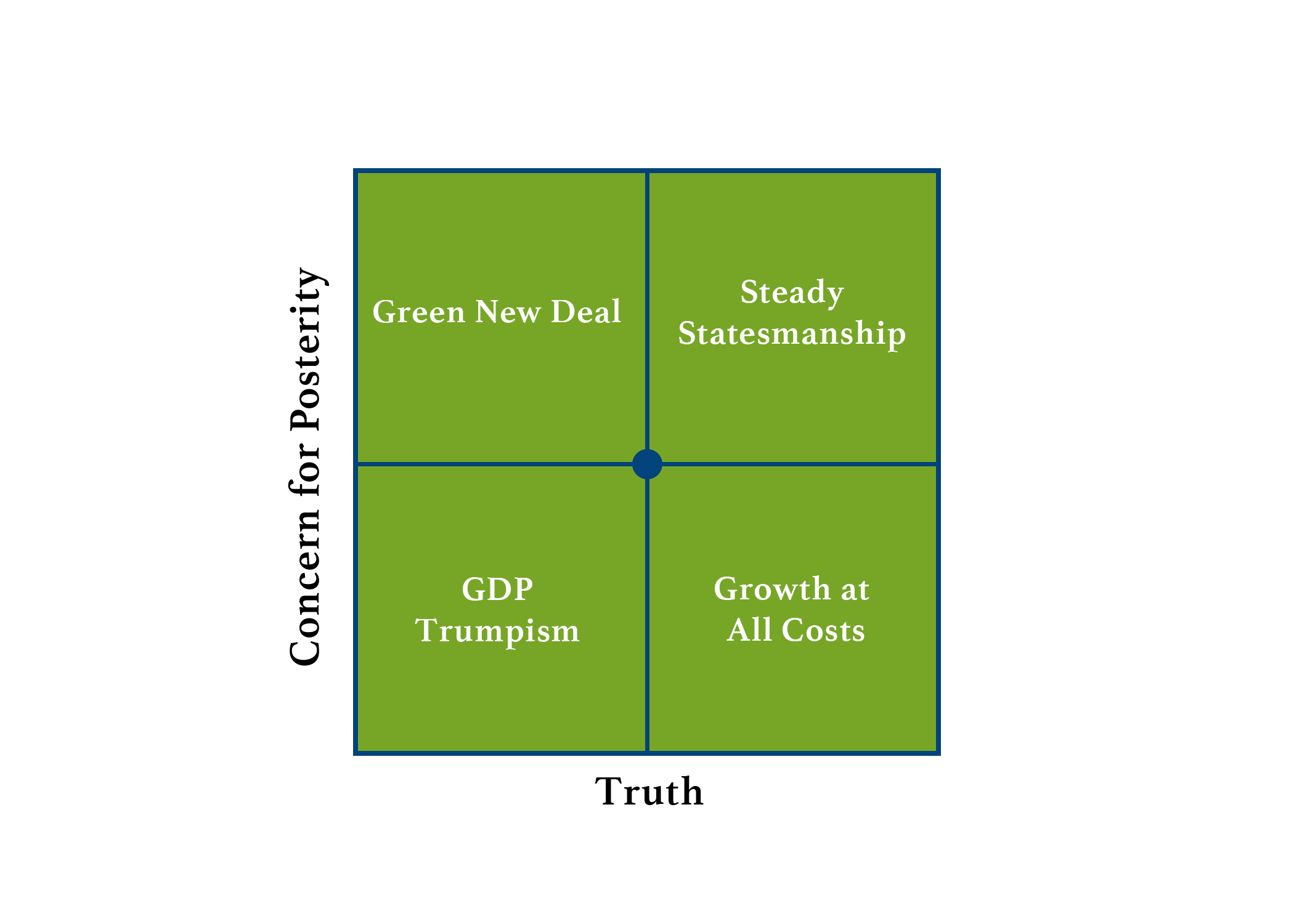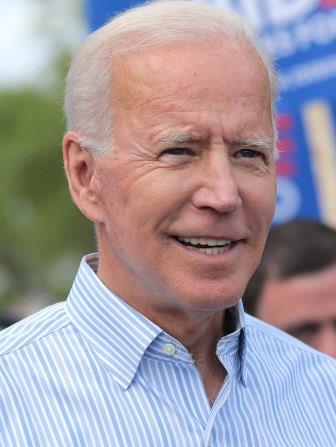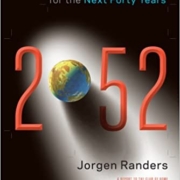A Steady-State Analysis of the 2020 Presidential Election
by Brian Czech
We now have a 46th President-Elect, with Joe Biden promising to restore the soul of America. What does it mean for advancing the steady state economy as the sustainable alternative to growth? And what did we learn in the process?

Donald “The Duck” Trump. (CC0, White House)
I for one ended up with egg on my face, if not a whole omelet, by calling Trump a lame duck way back in early August. Although such labeling was largely for purposes of engendering a meme (“Donald ‘The Duck’ Trump”), I’d also hypothesized that a fairly resounding majority had had enough of Trump World. Enough of a majority, perhaps, to dampen Trump’s tirades with a tinge of temperance. Turns out I was as wrong as the pollsters. Trump kept right on strutting and preening for another three months; not a lame duck at all but a spring gobbler on steroids, surrounded by loyal broods of hens and jakes.
Omelet fully on face, I also had to eat some crow from November 3–5 or so. I’m just relieved to have picked the winner—happy as a lark actually—even if Biden won by the down of a chickadee’s breast. Why there was so much drama, I ran out of bird metaphors. (Never mind the albatross of Trump’s legal challenges).
Like so many others, I’m not convinced the closeness of the election reflects well upon the American body politic. How could such an arrogant, greedy, conniving ignoramus manage to impress, loyalize, and even endear 72 million of us? Most surprising to me is that the 72 million were largely scattered around the countryside—in places like where I came from. Heck, I thought the rural folks were still common-sense, modest, honest, hardworking countrymen and women that preferred an Honest Joe over a Dishonest Donald every time.
Hey, here’s a thought: Maybe the 72 million were actually voting for Mike Pence!?
While I tend to jest, there’s no thumping of chest. The election was close enough that no overwhelming mandate can be claimed. Besides, Biden is no steady-state miracle worker in his own right. Let’s take a look at what we’ve won and what we’ve lost, not from the perspective of Politico or The Hill or the National Review, but through the lens of advancing the steady state economy.
What We Lost
What we lost—“we” meaning steady staters—was a wealth of bad-growth education. Trump was the single best example—possibly in history—of the obsession with GDP. He was the dark underbelly of economic growth, the epitome of economic asininity, the posterchild of pro-growth philistinism. The examples he set with trashing the planet, scrapping international agreements, denigrating “shithole countries,” etc., illuminated the chambers of a mind that was hellbent on growth. Greedy growth. Soul-less growth. Growth at all costs. But soon he’ll be out of the limelight. While he may remain on a mural here and there, serving as some sort of cult figure, he’ll be increasingly discredited and his policy relevance will be nil.
So, while Biden’s victory is a step toward healing the country’s psyche, our learning and teaching opportunities will ironically suffer. The steady stater losing Trump is like the criminologist losing Ted Bundy. One of the most-studied serial murderers in history, Bundy was executed in 1989. Suddenly there was nothing left to study! Similarly, Trump won’t be “bad-growthing” any longer, at least not after Inauguration Day, and we won’t be able to teach, “That’s what we get with a GDP growth obsession.”
Yet we had quite an educational ride with Trump, no? As he announced upon taking office, GDP growth was his single greatest policy concern. Now it’s true that he knew little about public policy, so what else could he announce? Aside from GDP growth there was wall building, getting rid of Obamacare, and regulatory rollbacks (designed primarily for GDP growth).
Why didn’t Trump know anything about other policies? Largely because of his obsession with growth, which went back to his pre-president days, and possibly even his pre-pubescent days. It kept him so busy, he found no time for learning about higher pursuits. First there was the growth of his own income and assets, and later of the entire GDP.
GDP growth was like Trump’s personal ego trip as the “CEO” of USA, Inc., a subsidiary of the Trump Organization. Trump loved to boast about setting records for this or that: GDP growth, the stock market, military buildup, audience size, conservative judges appointed, Twitter followers, etc. But in Trump’s mind and rhetoric, the greatest of these was GDP.
While Trump was an extreme example, I suspect that many of those preoccupied with GDP growth have a need to feel bigger and more powerful than peoples and nations without the capacity or concern for huge GDP figures. I propose, then, that the preoccupation with GDP growth says something about the soul of America. It’s a soul that’s been tarnished with greed and a false sense of accomplishment, accompanied by an intellectual laziness where “success” boils down to the simple measurement of materialistic activity. Without Trump providing such a telling example, we steady staters will have a harder time shining a light on this blotch in the soul. Let’s hope Biden and Harris have already spotted it.
Will Democrats Ever Catch On?
Aside from our growing band of steady staters, a much larger group of Americans will be losing a once-in-a-lifetime opportunity. These would be Democrats. If they’d thought a little harder outside the box, they could have seen the stupidity of “GDP Trumpism,” the phrase we use to describe a growth-at-all-costs mentality coupled with Trump-like levels of dishonesty. If Democrats had caught on quickly enough, they could have re-set the political landscape and tilted the board toward a bluer shade of purple.

GDP Trumpism: Shortsighted and greedy, dishonestly so.
To refute Trump specifically on grounds of his GDP obsession would have provided a systemic and long-lasting advantage to the Democratic Party. That’s because, ever since the contrast between Jimmy Carter and Ronald Reagan, Republicans have jockeyed visibly harder than Democrats to prove their ability to grow the economy. For anyone old enough, it’s hard to forget Jack Kemp and his unhitched rant, “We should double the rate of growth, and we should double the size of the American economy!”
For their part, Democrats have argued from a severely disadvantaged position. Instead of taking the high road—morally and intellectually—and stating “that’s enough” of the GDP growth phase in American history, they’ve sacrificed themselves on the altar of political expediency. Instead of truthful steady statesmanship, they’ve been running with the devil and the win-win rhetoric, “There is no conflict between growing the economy and protecting the environment.” Many Democrats have even tried to compete with Republicans for the title of GDP growth champion, doubling down on the wrong message for environmental sustainability and economic wellbeing.
The Democratic Party missed a golden opportunity to break out of their win-win rhetorical rut with Trump in the White House. It may never again be so easy to counter the stupidity and repulsiveness of the GDP growth obsession. The analogy is stark, but Democrats failing to provide steady-state leadership during Trump’s stay in the White House is like the failure to ban assault rifles in the wake of the Las Vegas shooting spree. The biggest difference is that the number of lives endangered by GDP Trumpism is orders of magnitude more than the 60 killed and 411 wounded by Stephen Paddock and his arsenal.
Just as the gun control movement struggles onward—striving for assistance from a Democratic establishment of limited power and milquetoast tendencies—steady staters will struggle onward as well. The biggest difference is that, at least among the rank and file party members (as opposed to party hacks funded by Wall Street), limits to growth will become increasingly evident on both sides of the aisle. In fact, the steady state economy will find a special resonance with many conservatives out in “the grange” who’d like to see their farming, hunting, and fishing maintained instead of undermined by developers, higher taxes, and no-trespassing signs.
Yet, as long as the Republican Party remains the party of growth at all costs, the Democratic Party has the opportunity to forge a victorious electoral path in the climate-changed, limits-to-growth landscape of the 21st century.
What We Gained
What did we gain, in steady-state terms, with the election of Joe Biden? First, of course, is the end of GDP Trumpism. But that’s only a “gain-by-loss” accomplishment. To solve the problems caused by economic growth, problems that built up before and during the Trump Administration, we need a more proactive approach then merely removing Trump.
The gold standard would be a president-elect who is loud and clear about limits to growth and the need for a steady state economy. This is one of the top reasons CASSE maintains a signable position on economic growth: to give politicians (and everyone else) the opportunity to demonstrate their understanding of steady-state economics, and to better inform voters about who’s who in steady statesmanship.

While he’s no steady stater, Joe Biden will put an end to “GDP Trumpism.” (CC BY-SA 2.0, Gage Skidmore)
We do not have a steady stater in Joe Biden. In fact, we have a decidedly pro-growth politician. Yet he is better than most, if only by virtue of maintaining strong interests and concerns with other policy goals that conflict with growth. The best example is Biden’s position on climate change. He seems serious and sincere about the goal of net zero greenhouse gas emissions by 2050.
Steady staters understand that the odds of maintaining GDP growth while phasing out fossil fuel combustion are about the same as having your cake and eating it too. Ultimately the key question arises: What do you want more, your cake or eating it? Likewise, Biden will encounter the question of what he wants more: a stable climate or GDP growth?
At least Biden respects science and will listen to scientists about the dire consequences of global warming. Being less obsessed with GDP—far less than Trump—he will at least attempt to balance his priorities. Balancing priorities is a far cry from growth at all costs, so the rate of GDP growth will at least decline. Alas, that won’t be enough to stave off environmental and economic crisis, but it will buy us some time to develop real steady statesmanship, which can stave off such crises (or at least certain levels thereof).
Biden’s position on COVID-19 follows much the same script, and with even greater urgency. Because of the immediacy of a pandemic, we’ll see his position play out in real time. Trump was so obsessed with GDP growth, he opposed common-sense protections (such as temporary shut-downs of eating and drinking establishments) because they slowed the rate of commerce. Biden cares more about public health; he will support or enforce certain shutdowns as guided by the scientists on his already-appointed coronavirus task force. Again, though, as a pro-growth politician he will couple these shutdowns with the point that shutting down for the sake of public health allows for faster and higher GDP growth upon recovery. He’ll be right about that, but it will be another unsustainable, pyrrhic GDP “victory,” and a failure to practice steady statesmanship.
What’s Next for Steady Staters?
Advancing the steady state economy is destined to be an ongoing struggle, perhaps for the remainder of the human run on Earth. Limits to growth in the 21st century—ultimate, global limits never encountered before—will make the steady state economy one of the most important goals. Yet, as soon as a certain degree of stability might be achieved, you can bet the obsession with growth will come out of the woodwork to haunt us. The effort to maintain a steady state economy, then, will be similar to the effort required to maintain democracy. It’s going to take alert citizens to see through the corrupt efforts of greedy CEOs and politicians obsessed with power, personal assets, and GDP growth.
Using the terms of drama, the stage has been set for advancing the steady state economy. The exposition has already been performed with Dalyist scholarship and CASSE-like activism. The bulk of the show will play out in the coming decades. Public education on limits to growth, re-branding of the environmental movement, conscientious consumerism, steady-state legislation, and even religious re-focusing; these will be some of the major acts in the drama for a sustainable USA and world. GDP Trumpism amounted to the “inciting incident,” with crises brewing in the environment, the economy, and international diplomacy. Heroes are badly needed for a denouement of wellbeing, which absolutely entails the steady state economy.

Given her unique upbringing, Kamala Harris might have a steady-state mindset. (CC BY-SA 3.0, Gage Skidmore)
Joe Biden may not amount to a steady-state hero, but a Biden Administration can open doors for such heroes to appear. The emphasis on sound science, with climate change and coronavirus as precedents, should allow for serious questioning of GDP growth as a policy goal. Who might these heroes turn out to be? Might they include a Secretary of the Interior who recognizes the fundamental conflict between economic growth and environmental protection? A Secretary of Energy who gets it about limits to renewables and the perils of nuclear and fossil options? A Secretary of Defense who assesses the spreading landscape of resource wars as an inevitable outcome of pursuing GDP growth?
One thing is for sure; our list of heroes cannot be confined to the halls of academia, the airwaves of talk shows, or the electrons of social media. The list has to include men and women of action and policy, bringing their knowledge of limits to growth into steady statecraft.
Which brings us almost full circle (with the option of resurrecting the ornithological metaphors). While we’d have to be crazy as a loon to think that 72 million Americans voted for Mike Pence, by no means was Kamala Harris an insignificant element of the Biden ticket. Presumably millions—possibly many tens of millions—of Americans voted as much for Harris as for Biden. Birds of a feather flock together, and many Americans may have voted partly for a woman, a black woman, a woman of South Asian descent, or simply a non-Caucasian regardless of gender. Yet in most cases I think they voted primarily for a smart, courageous person to help guide the country, not only as a back-up plan for an elderly Biden but as a potential presidential candidate for the coming cycles.
Steady staters should take a special interest in Harris. Her parents separated when she was five years old, and afterward she lived primarily with her mother. Her Jamaican-born father, though, was a Ph.D. economist with a specialty in economic growth theory. While his education was neoclassical, he was a critic of conventional growth theory. Despite the separation of her parents, the Vice President-Elect may have taken some interest in what her father did for a living. For all we know, she might be well aware that neoclassical growth theory—which tends to support notions of perpetual growth—has been discredited for various reasons.
Harris’ Indian-born mother was a Ph.D. biomedical scientist, and one doesn’t garner such a title without a broad-based education in the biological sciences. It’s not a stretch to think the Vice President-Elect absorbed some basic scientific principles during her upbringing. She also spent significant amounts of time in India where limits to growth are readily observed by anyone looking for them—or by those with formative thoughts about growth and the sciences.

Strong, steady, and soaring: the bald eagle as a metaphor for an American steady state economy. (CC0, Source)
Yes, Joe Biden’s been a pro-growth politician, but let’s give the Biden Administration a chance. Let’s see what Kamala Harris brings to the table of macroeconomic discussion. Let’s see who ends up comprising the Cabinet, especially in those key roles at the Interior, Energy, and Commerce departments. Let’s see, too, what kind of big-picture, long-term central intelligence is brought to bear.
And let’s do more than see. Let’s weigh in on these pending appointments while it’s still relatively early in the game. Call and write Biden, Harris, and your elected representatives in Congress, and tell them you want a Cabinet that acknowledges the conflict between economic growth and environmental protection, economic sustainability, national security, and international stability. Tell them you want long-term planning for a steady state economy to begin with this administration. Tell them you want steady statesmanship in international diplomacy. Tell them your vision of a steady state economy is one of the main reasons you voted for them and rejected GDP Trumpism.
Tell them you want an economy that soars like an eagle! Not frantically flapping ever upward like some foolish phoenix going up in flames, nor plunging downward like an inglorious coot into a polluted lagoon. Soaring, rather, like a bald eagle: steady, strong, and sustainable.
Now that would be an exceptional America—for a long, long time.

Brian Czech is the executive director of CASSE.









Great article, but we need to propose someone for Secretary of the Interior, and maybe send a letter to the Biden campaign. I propose John De Graaf, author of “Affluenza” and ‘The Backpacking Theory of Life”. If we just wait for Biden,
he’ll put a GDP person in there. I did a recent interview with him, “Meet John De Graaf”, and he does have a following.
John de Graaf (a CASSE signatory) would be great as an advisor in some capacity, but for Secretary of the Interior, we need an expert in natural resources conservation. There is no shortage of Ph.D. scientists in forestry, wildlife ecology, fisheries, range management, and general renewable natural resources—scientists who get it about limits to growth— who are simultaneously excellent communicators and administrators. Another solid option would be a master of ecological economics.
Want names? I’d start with Abhijit Banerjee, Pat Choate, Vera Cole, Andy Dobson, Josh Farley, James Hansen, Patty Glick, Paul Hawken, Denis Hayes, Richard Heinberg, David Korten, Paul Krausman, Doug La Follette, David Orr, and Gus Speth. Apologies to those who should be on this list!
Pretty interesting , but not sure I agree with your assessment of Trump. Mostly he is an example of failing up. But not knowledgable about hw an economy works. Did not know of Harris’s family history. But politis makes growthersw, unfortuante as it is, so I hold little hope for harris on reducing thesize of GDP and creating prosperous communities instead of oliigarchic over abundance.
I don’t think we disagree about Trump. You (and I) are right: Trump is not knowledgeable about how the economy works. But you don’t have to be very knowledgeable to realize that GDP will grow—and grow fast for a short period of time at least—if you trash all the regulations that help hold it in check. Any “stable genius” (as the unstable ignoramus called himself) can grow the GDP when they trash everything else including the environment, public health, and international relations.
But of course GDP growth isn’t sustainable, and some spurts of growth even less so. In Trump’s case, recklessness on the public health front backfired on him. GDP took an immediate hit from the COVID-19 pandemic and Trump made it worse by failing to secure a recovery, which would have required strong and swift protection of Americans from the virus.
I am inclined to think this is a glass one quarter full sort of moment. Neither major US party has really connected the dots on economic growth and how that must, inevitably, devour our only habitable planet.
However, it seems fair to say that the new blood is further along in connecting the dots. Perhaps some useful steps will be undertaken. I’ll keep my fingers crossed.
Thanks Brian, a great blog. No mention of Sanders in there I note. I fear Cole Thompson is 100% right. Certainly here in Australia we are floundering around with both major parties asserting that endless economic and population growth are worthwhile goals in themselves. Not even the Greens are prepared to repudiate it. We don’t seem to have a single person in our national or state Parliaments prepared to suggest that endless growth might not actually be a sensible goal. Not much dot joining going on here folks. But we live in hope.
True, no mention of Bernie Sanders in this one. We suspect that, of all the U.S. Senators, with the possible exception of Tammy Baldwin (Wisconsin), Sanders would tend to get it about limits to growth. Most good Vermonters do! We haven’t had the opportunity yet for a meeting with him; only a brief hallway chat. It’s not easy to get face time with a politician of his prominence. But we’ll try again and we’re keeping an eye on him for his potential seat on the Biden Cabinet.
Also, while you and Cole are probably right about the paucity of steady-state thinking in the Australian parliament and U.S. Congress, respectively…well that’s what we’re here to fix!
We (Australia) do have someone in the Victorian State Parliament: Clifford Hayes of the Sustainable Australia Party. Until 2016 we also had Kelvin Thompson in Federal Parliament. See http://www.sustainableaustralia.org.au/mps and http://www.sustainableaustralia.org.au/sustainable_australia_party_appoints_kelvin_thomson_as_national_media_spokesperson
If he’s a steady stater, we stand corrected, and gladly so!
I do know Geoff Moseley and our Australian chapter directors work hard at advancing the steady state economy. Most recently, for example, Martin Tye has generated a lot of interest and support, and he may run for office again, and/or help advise a steady-state candidate. He did a great job on our podcast a few weeks ago.
Now, can you get Mr. Hayes to sign the CASSE position on economic growth? By doing so, he’ll empower other politicians to acknowledge the need for a steady state economy. Strength in numbers.
We (Australia) do have someone in the Victorian State Parliament: Clifford Hayes of the Sustainable Australia Party. Until 2016 we also had Kelvin Thompson in Federal Parliament. See http://www.sustainableaustralia.org.au/mps and http://www.sustainableaustralia.org.au/sustainable_australia_party_appoints_kelvin_thomson_as_national_media_spokesperson
I’m learning by reading about the names you mentioned. Could CASSE submit list of names?
Or should we do so as individuals?
This is based on an issue and not a political party so it would not be sectarian.
Since at least the investments of renaissance European trade, economic activity has depended upon speculative group funding.
It’s been clear in the latter half of 20th c that the growth of derivative investments – released by the Reagan removal of securities laws and regs, that the investment markets have increasingly become mere short-term gambling.
This gambling has exploded the cash available to create the exploitative growth we see, from mining to the horizontal stacks of dead redwoods down the street from here, in transit to Oriental mills , distributed to the massive worldwide building industry.
The entire process has not really slowed due to COVID. It appears to have merely paused for an angry vacation.
The masses of humanity continue to college largely for business/marketing degrees, primarily focused on serving as “middlemen” , “services.”
That the US under trump became a diseased pariah nation also only momentarily and locally slows the cancer, excuse me, growth. The investment economy has not substantially slowed.
Only such disease-spreading services like restaurants, bars, etc., have contracted.
Visions of sugarplum cash still multiply in the minds of would-be immigrants.
You see, ALL species disperse, using their senses to evaluate likely better conditions.
Only a serious catastrophic depopulation event (Covid is not, with about 17% asymptomatic, another 80% mildly affected) has ever sufficiently reduced an ecologically released species.
Humans are such, spreading massively during the last 60k years of Pliocene and 10k of the Pleistocene.
A concept related to moving baseline syndrome causes humans to imagine that their youth was Edenic, unwilling to surrender tech while desiring greater relief from competitive crowds.
Who now, for example would desire severance from their phones or internet? My grandmother spent the ear?y part of her life before autos and planes. Who now would accept the time before Europe deforested itself in Renaissance period?